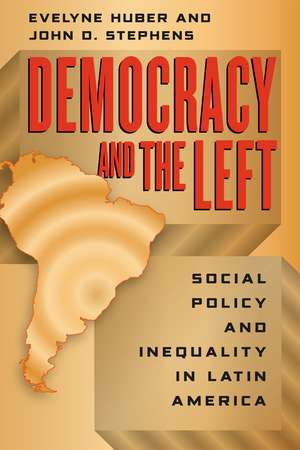Democracy and the Left: Social Policy and Inequality in Latin America
Autor Evelyne Huber, John D. Stephensen Limba Engleză Paperback – 31 aug 2012
In Democracy and the Left, Evelyne Huber and John D. Stephens argue that the resurgence of democracy in Latin America is key to this change. In addition to directly affecting public policy, democratic institutions enable left-leaning political parties to emerge, significantly influencing the allocation of social spending on poverty and inequality. But while democracy is an important determinant of redistributive change, it is by no means the only factor. Drawing on a wealth of data, Huber and Stephens present quantitative analyses of eighteen countries and comparative historical analyses of the five most advanced social policy regimes in Latin America, showing how international power structures have influenced the direction of their social policy. They augment these analyses by comparing them to the development of social policy in democratic Portugal and Spain.
The most ambitious examination of the development of social policy in Latin America to date, Democracy and the Left shows that inequality is far from intractable—a finding with crucial policy implications worldwide.
Preț: 294.19 lei
Nou
Puncte Express: 441
Preț estimativ în valută:
56.30€ • 58.56$ • 46.48£
56.30€ • 58.56$ • 46.48£
Carte tipărită la comandă
Livrare economică 15-29 aprilie
Preluare comenzi: 021 569.72.76
Specificații
ISBN-13: 9780226356532
ISBN-10: 0226356531
Pagini: 368
Ilustrații: 12 figures, 36 tables
Dimensiuni: 152 x 229 x 23 mm
Greutate: 0.5 kg
Editura: University of Chicago Press
Colecția University of Chicago Press
ISBN-10: 0226356531
Pagini: 368
Ilustrații: 12 figures, 36 tables
Dimensiuni: 152 x 229 x 23 mm
Greutate: 0.5 kg
Editura: University of Chicago Press
Colecția University of Chicago Press
Notă biografică
Evelyne Huber is the Morehead Alumni Distinguished Professor of Political Science at the University of North Carolina, Chapel Hill. John D. Stephens is the Gerhard E. Lenski, Jr. Distinguished Professor of Political Science and Sociology at the University of North Carolina, Chapel Hill. Together, they are the coauthors of Development and Crisis of the Welfare State.
Cuprins
Figures
Tables
Acronyms
Preface and Acknowledgments
1 Introduction
2 Theoretical Framework and Methodological Approach
3 Strategy for Redistribution and Poverty Reduction
4 The Development of Social Policy Regimes in the ISI Period
5 The Determinants of Social Spending, Inequality, and Poverty: Quantitative Evidence
6 Neoliberal Reforms and the Turn to Basic Universalism
7 Iberia and the Advanced Latin American Social Policy Regimes: Explaining the Different Trajectories
8 Conclusion
Notes
References
Tables
Acronyms
Preface and Acknowledgments
1 Introduction
2 Theoretical Framework and Methodological Approach
3 Strategy for Redistribution and Poverty Reduction
4 The Development of Social Policy Regimes in the ISI Period
5 The Determinants of Social Spending, Inequality, and Poverty: Quantitative Evidence
6 Neoliberal Reforms and the Turn to Basic Universalism
7 Iberia and the Advanced Latin American Social Policy Regimes: Explaining the Different Trajectories
8 Conclusion
Notes
References
Recenzii
"With the publication of Democracy and the Left, Evelyne Huber and John D. Stephens contribute another major book, adding to their stellar careers. Latin America has long been characterized by high poverty rates and the sharpest inequalities in the world. Huber and Stephens argue persuasively that poverty and inequality are not intractable problems. Through careful research, they show that, because democracy allows progressive political parties and social forces to influence policy and come to power, it generally has a positive impact on poverty and inequality when it lasts for at least twenty years."
"Evelyne Huber and John D. Stephens have produced another classic contribution to the literature on the political dynamics of social policy. Combining sophisticated cross-national quantitative analysis with comparative historical analysis founded on encyclopedic knowledge of the cases in question, Huber and Stephens demonstrate how and why politics makes a fundamental difference to national welfare. As Latin America increasingly becomes a reference point for those interested in progressive policy outcomes, this book is a must for the libraries of social scientists and policy makers."
“Evelyne Huber and John D. Stephens have provided the most theoretically profound, empirically thorough, and wide-ranging work that advances the more optimistic view that democracy itself plays a crucial role in stimulating redistribution in Latin America and that the political left is the most important agent in effecting this change. Democracy and the Left is an important, major book that advances a powerful argument about a significant topic and substantiates it with an impressive range of research.”
“John D. Huber and Evelyne Stevens examine the resurgence of left-wing parties, arguing that the left has used social policy to reverse the rise of inequality in Latin America. Drawing on empirical data, they provide cases studies of five Latin American countries that have used social policy to bridge the gap between the rich and the poor. This is an important contribution to both policy formation and analytic development, sure to challenge assumptions and provoke arguments among policy makers, civil society activists, and pundits.”
“In this very welcome and illuminating volume, Evelyne Huber and John D. Stephens show how changing political forces and growing democratisation in Latin America have created the conditions for social policy reforms that are gradually helping to reduce poverty and inequality across the continent.”
“[Huber and Stephens’s] provocative arguments are built around a sound analytical framework which guides the selection of data and methods used, as well as the claims made. . . . There is also a compelling and specific adaptation and application of theories of policy formation applied to the Latin American context. . . . Without a doubt a massive contribution to Latin American studies.”
“The excellent Democracy and the Left offers compelling support for Huber and Stephens’s greater optimism about the long-run capacity of democracy and left governments to reduce inequality through redistributive social policy. Drawing from their own previously developed ‘power constellations theory,’ the authors demonstrate how Latin America’s class structure and lack of consistent democracy historically meant a weak Left, how recently lack of state capacity hindered social policy development, and how in the 1980s transnational forces pressed for equality-reducing reforms. [The book] deserves a wide audience, and not only among Latin Americanists.”
“An impressive work that is theoretically consistent, exhaustive in terms of data collected, and methodologically sophisticated, combining the solid use of statistical tools with a comparative historical analysis of selected cases. . . . [Democracy and the Left] manages to establish not only statistical but also causal links between the consolidation of democracy, redistributive policies, and the reduction in inequality and poverty in Latin America. It is an obligatory text for students of the region as well as for those who study these topics in different contexts.”






















